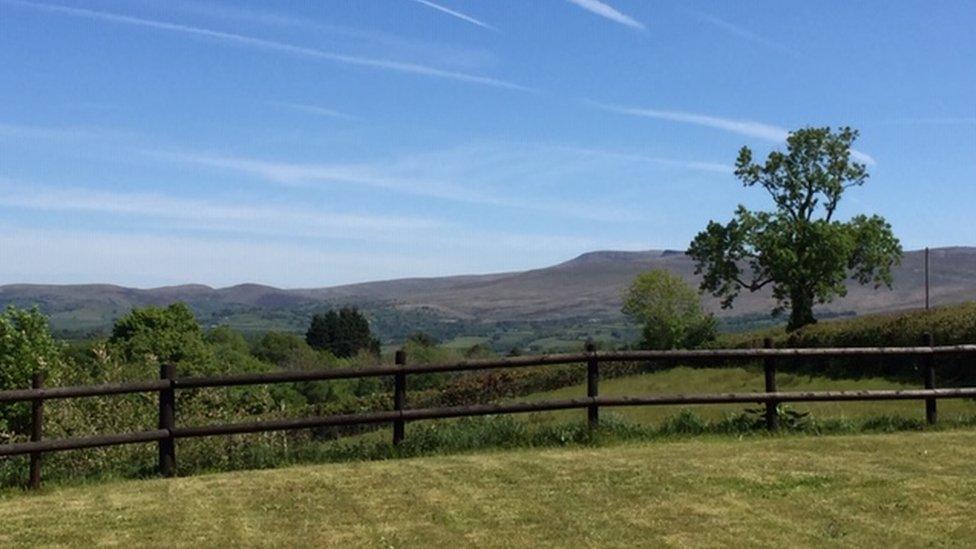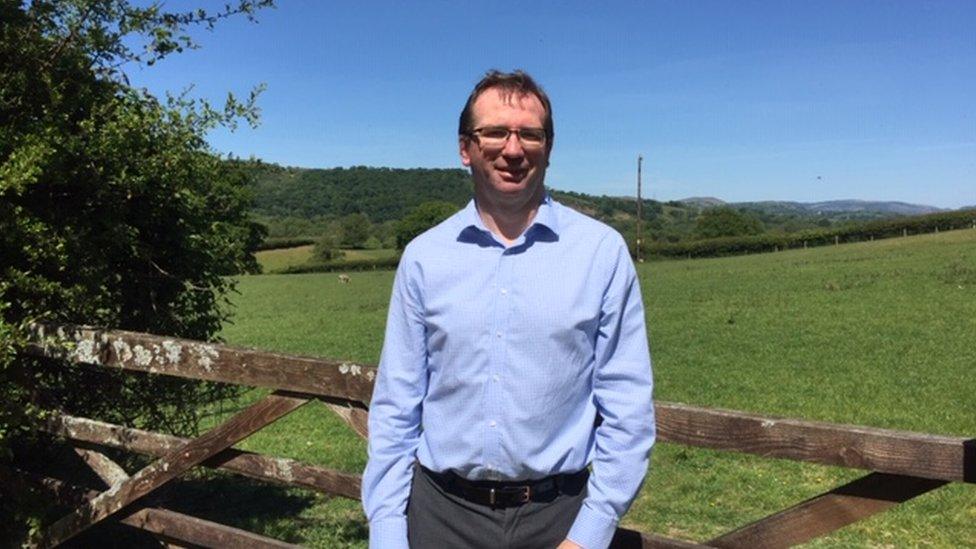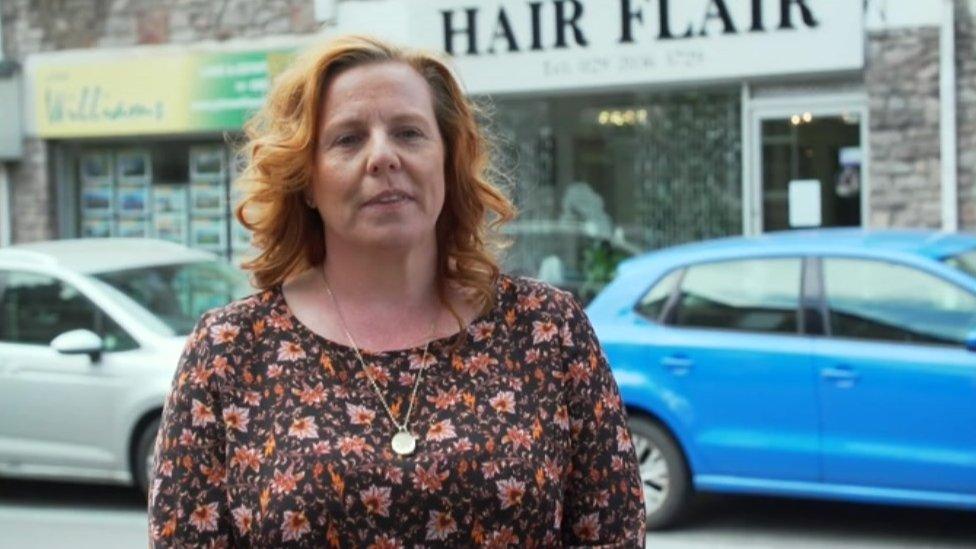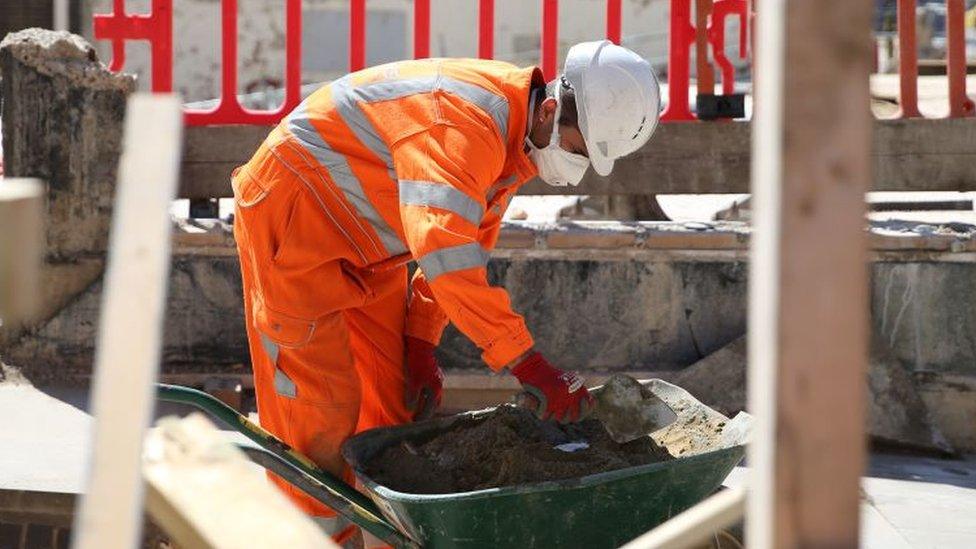Coronavirus: Don't forget rural communities, farmer pleads
- Published
- comments

Garry Williams converted buildings on his land into holiday cottages overlooking the Black Mountains
The economic impact of the coronavirus pandemic could hit harder and last longer in rural communities, a sheep farmer has warned.
Garry Williams, who also runs self-catering cottages, said incomes in some parts of Wales were dependent on tourism and agriculture.
Farming unions said more pressure needs to be placed on governments to ensure the communities get the help they need.
The Welsh Government said a resilience fund was expected to reopen in June.
It follows warnings Wales will be more exposed to the economic impact of lockdown than other parts of the UK.

Garry Williams says tourism and agriculture keep rural economies alive
Mr Williams, from Gwynfe in Carmarthenshire, made a huge investment to convert buildings on his land into holiday cottages with hot tubs overlooking the Black Mountains.
He said with agriculture incomes dwindling, it seemed the best way to survive in a remote location.
But the pandemic means his family has already lost thousands of pounds in income due to cancelled bookings, and may lose the summer season completely.
"Farming incomes are at best unpredictable, so we borrowed the money and made the investment for the future.
"We're shut now and there's no complaints about that, we need to protect our communities, but it means we've got no income and still got a mortgage to pay."

Garry Williams' luxury self-catering cottages are currently closed
He said outside of agriculture and tourism, the area was "pretty much a retirement haven".
"We are the drivers of the rural economy, we invest our own money to create wealth.
"I'd say to Welsh Government: 'We need support - don't forget about rural Wales, don't forget agriculture, because without agriculture and tourism, we've got nothing'."
Many rural businesses were facing financial pressures before lockdown due to concerns over Brexit, falling livestock prices and harsh weather conditions such as flooding.
Welsh Government figures showed by 11 May, nearly 10,000 businesses had applied to its Economic Resilience Fund - demand so high the scheme has had to be paused.
They include almost 7,000 "micro-businesses", many based in rural areas.
But if farming businesses have diversified from agriculture, only the diversified elements of their businesses would be eligible.
Farming union NFU Cymru said it was putting pressure on governments in Cardiff and in Westminster.
Director of policy Dylan Morgan said: "I think it's vitally important that we make sure that the funding and support schemes available for other sectors of the economy are also available for agriculture and for rural businesses and for those farms who've diversified."

Dylan Morgan says NFU Cymru has been lobbying the Welsh and UK governments
But Dr Wyn Morris, a lecturer at Aberystwyth University's Business School, said the current crisis could present new opportunities for rural businesses.
"Some of the positive messages that we've seen, the community spirit, the co-working, we've seen some businesses adapt, we might see a change in consumers where they value local services and products far more.
"Having said that, I'm concerned about how many businesses will be left, how many will be able to re-start after this."
According to a report from the Bevan Foundation, external, rural areas and parts of the south Wales valleys are expected to be hardest hit economically by the pandemic, having seen the highest level of business closures and already having a relatively weak economy.
The Welsh Government said it was continuing to liaise with Welsh stakeholders in farming and the food and drink sectors.
An official said applications to the second phase of the Economic Resilience Fund were expected to open in June, and would also allow companies not currently registered for VAT to access the cash.
"In addition to funding to support dairy farmers - who have felt the immediate impact of the pandemic - we also have marketing campaigns for the dairy and red beef sectors to increase consumer demand, and introduced intervention and private storage aid schemes," said a spokesman.
- Published14 May 2020

- Published13 May 2020

- Published13 May 2020
